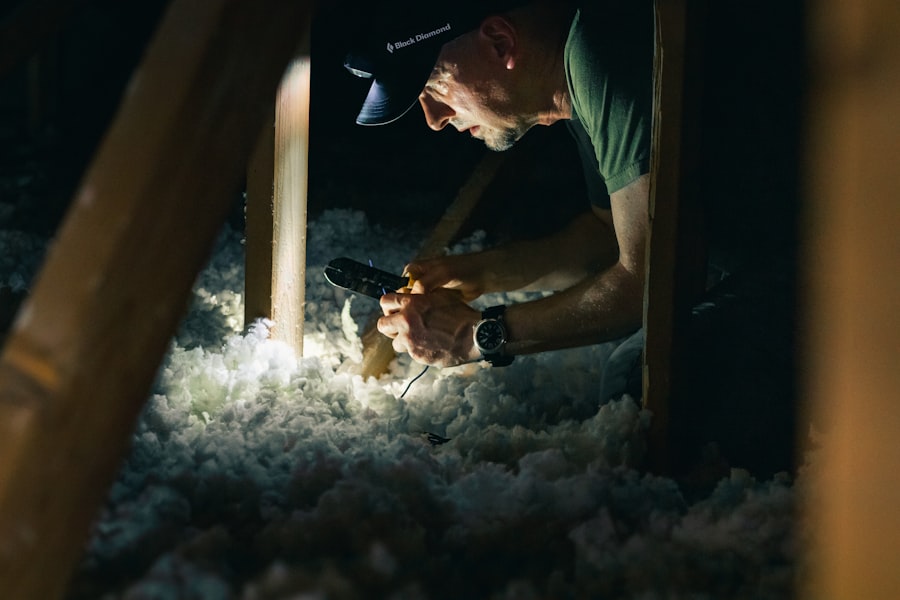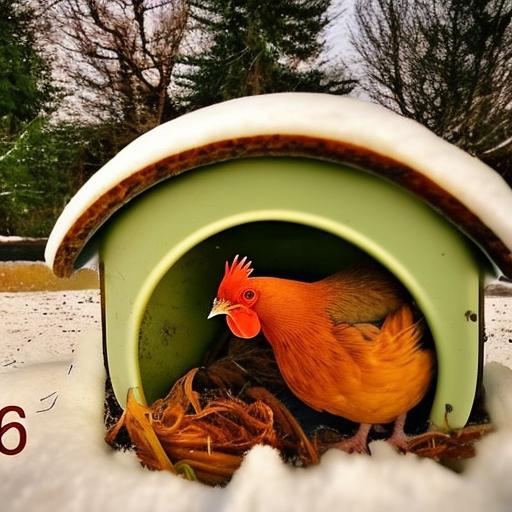Keeping chickens warm in winter is essential for their health and well-being. As the temperatures drop, chickens can be susceptible to cold stress, which can lead to illness or even death. In this blog post, we will discuss various ways to keep your chickens warm and happy during the colder months.
Key Takeaways
- Proper insulation is crucial for keeping chickens warm in a coop
- Choosing the right bedding can help regulate temperature and moisture
- Adequate ventilation is important for air quality, but should not compromise heat
- Heat lamps can be effective, but must be installed and maintained properly
- Feeding chickens the right foods can help keep them warm and healthy in winter
Understanding the Importance of Proper Insulation
Proper insulation is crucial for maintaining a warm and comfortable environment for your chickens. Insulation helps to retain heat and prevent drafts, which can cause cold stress in chickens. One of the most effective ways to insulate your chicken coop is by using insulation materials such as foam boards or fiberglass insulation. These materials can be installed on the walls and ceiling of the coop to create a barrier against the cold.
Another important aspect of insulation is sealing any gaps or cracks in the coop. These small openings can allow cold air to enter and warm air to escape, making it difficult for your chickens to stay warm. Use caulk or weatherstripping to seal any gaps around windows, doors, and vents.
Choosing the Right Type of Bedding for Your Chickens
Choosing the right bedding is important for keeping your chickens warm and dry. Bedding materials such as straw, wood shavings, and sand can provide insulation and absorb moisture. Straw is a popular choice because it is affordable, readily available, and provides good insulation. Wood shavings are another option that can provide warmth and absorb moisture effectively.
It’s important to regularly clean and replace the bedding in your chicken coop to maintain a clean and healthy environment for your chickens. Wet bedding can lead to dampness and mold, which can be detrimental to your chickens’ health.
Providing Adequate Ventilation without Compromising Heat
Proper ventilation is necessary for maintaining good air quality in the coop. It helps remove moisture, ammonia, and other gases that can build up and cause respiratory problems in chickens. However, it’s important to balance ventilation with heat retention to prevent cold stress in chickens.
To achieve this balance, you can install vents or windows near the ceiling of the coop to allow warm air to escape without creating drafts at ground level. You can also use adjustable vents that can be opened or closed depending on the weather conditions.
Installing and Maintaining a Heat Lamp
A heat lamp can provide additional warmth for your chickens during the colder months. It’s important to install and maintain the heat lamp properly to prevent fire hazards and ensure your chickens’ safety. Hang the heat lamp securely from the ceiling of the coop, making sure it is out of reach of the chickens. Use a heat lamp with a guard to prevent accidental contact with the hot bulb.
Regularly check the heat lamp for any signs of damage or wear and tear. Replace the bulb if it becomes dim or starts flickering. It’s also important to monitor the temperature in the coop regularly to ensure that it doesn’t get too hot or too cold.
Tips for Keeping Water from Freezing in Winter

Water is essential for your chickens’ health, but it can freeze in winter. To prevent freezing, you can use heated waterers that are specifically designed for cold weather. These waterers have built-in heaters that keep the water from freezing.
Another option is to use heated base plates or heated rocks under the waterers to keep them warm. You can also add electrolytes to the water to lower its freezing point and prevent it from freezing.
Feeding Your Chickens the Right Foods to Keep Them Warm
Feeding your chickens the right foods can help keep them warm from the inside out. During winter, you can provide extra energy and warmth by feeding them cracked corn or scratch grains. These foods are high in carbohydrates and can help generate heat in their bodies.
It’s also important to ensure that your chickens have access to fresh and nutritious food throughout the day. During winter, their metabolism increases to keep them warm, so they may require more food than usual. Make sure to provide a balanced diet that includes a mix of grains, vegetables, and protein.
Preparing for Power Outages and Emergencies
Power outages and emergencies can happen during the colder months, leaving your chickens without heat or electricity. It’s important to have a plan in place to keep your chickens warm and safe during these situations.
One option is to have a backup generator that can power the heat lamp and other essential equipment in the coop. Make sure to test the generator regularly and have enough fuel on hand.
You can also prepare an emergency kit that includes extra bedding, blankets, and hot water bottles. These items can provide temporary warmth for your chickens until the power is restored.
Monitoring Your Chickens for Signs of Cold Stress
Cold stress can be dangerous for chickens and can lead to illness or death. It’s important to monitor your chickens for signs of cold stress, such as lethargy, huddling together, pale combs and wattles, or decreased egg production.
If you notice any of these signs, take immediate action to warm up your chickens. Provide additional heat sources such as heat lamps or heating pads. You can also insulate the coop further by adding extra bedding or covering windows with blankets or plastic.
The Benefits of Keeping Your Chickens Warm and Happy
Keeping your chickens warm and happy during the colder months can have many benefits. Firstly, it helps maintain their overall health and well-being. When chickens are warm and comfortable, they are less likely to get sick or develop respiratory problems.
Secondly, keeping your chickens warm can increase their egg production. Cold stress can cause a decrease in egg production or even stop it altogether. By providing a warm and cozy environment, you can ensure that your chickens continue to lay eggs throughout the winter.
Lastly, keeping your chickens warm and happy is simply the right thing to do. As responsible chicken owners, it is our duty to provide them with the care and attention they need, regardless of the season. By following the tips outlined in this blog post, you can ensure that your chickens stay warm and comfortable all winter long.
If you’re looking for ideas on how to keep your chickens warm during the colder months, check out this helpful article on poultrywizard.com. They provide a range of interior ideas for your chicken coop, including tips on insulation, heating options, and ventilation. Whether you have a traditional coop or an A-frame design, this article has got you covered. For those who are considering converting a shed into a chicken coop, poultrywizard.com also offers a comprehensive guide on how to do it effectively. Don’t let the winter chill affect your feathered friends – click here to read more about keeping chickens warm: https://poultrywizard.com/keeping-chickens/chicken-coop-interior-ideas/
FAQs
What temperature range is suitable for chickens?
Chickens are comfortable in temperatures ranging from 50-80°F. However, they can tolerate temperatures as low as 20°F and as high as 90°F.
What are the signs of a cold chicken?
A cold chicken will appear lethargic, huddle together with other chickens, and may have a pale comb and wattles. They may also stop laying eggs.
How can I keep my chickens warm during winter?
You can keep your chickens warm during winter by insulating their coop, providing them with a heat source such as a heat lamp or heated pad, and ensuring they have access to plenty of food and water.
What bedding material is best for keeping chickens warm?
Straw, hay, and wood shavings are all good bedding materials for keeping chickens warm. Avoid using materials that retain moisture, such as newspaper or cardboard.
Can I use a space heater to keep my chickens warm?
It is not recommended to use a space heater to keep chickens warm as it can be a fire hazard. Instead, use a heat lamp or heated pad specifically designed for use with chickens.
What should I do if my chickens are still cold despite my efforts?
If your chickens are still cold despite your efforts, consider adding more insulation to their coop or providing them with additional heat sources. You may also want to consult with a veterinarian to ensure there are no underlying health issues.
Meet Walter, the feathered-friend fanatic of Florida! Nestled in the sunshine state, Walter struts through life with his feathered companions, clucking his way to happiness. With a coop that’s fancier than a five-star hotel, he’s the Don Juan of the chicken world. When he’s not teaching his hens to do the cha-cha, you’ll find him in a heated debate with his prized rooster, Sir Clucks-a-Lot. Walter’s poultry passion is no yolk; he’s the sunny-side-up guy you never knew you needed in your flock of friends!







